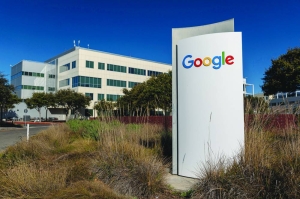Middle East
US considers a rare antitrust move: Breaking up Google


Google headquarters in Mountain View, California. A bid to break up Google is one of the options being considered by the Justice Department after a landmark court ruling found that the company monopolised the online search market.
A bid to break up Alphabet Inc’s Google is one of the options being considered by the Justice Department after a landmark court ruling found that the company monopolised the online search market, according to people with knowledge of the deliberations.
The move would be Washington’s first push to dismantle a company for illegal monopolisation since unsuccessful efforts to break up Microsoft Corp two decades ago. Less severe options include forcing Google to share more data with competitors and measures to prevent it from gaining an unfair advantage in AI products, said the people, who asked not to be identified discussing private conversations.
Regardless, the government will likely seek a ban on the type of exclusive contracts that were at the centre of its case against Google. If the Justice Department pushes ahead with a breakup plan, the most likely units for divestment are the Android operating system and Google’s web browser Chrome, said the people. Officials are also looking at trying to force a possible sale of AdWords, the platform the company uses to sell text advertising, one of the people said.
The Justice Department discussions have intensified in the wake of Judge Amit Mehta’s August 5 ruling that Google illegally monopolised the markets of online search and search text ads. Google has said it will appeal that decision, but Mehta has ordered both sides to begin plans for the second phase of the case, which will involve the government’s proposals for restoring competition, including a possible breakup request. A Google spokesman declined to comment on the possible remedy. A Justice Department spokeswoman also declined to comment.
The US plan will need to be accepted by Mehta, who would direct the company to comply. A forced breakup of Google would be the biggest of a US company since AT&T was dismantled in the 1980s. Justice Department attorneys, who have been consulting with companies affected by Google’s practices, have raised concerns in their discussions that the company’s search dominance gives it advantages in developing artificial intelligence technology, the people said. As part of a remedy, the government might seek to stop the company from forcing websites to allow their content to be used for some of Google’s AI products in order to appear in search results.
Divesting the Android operating system, used on about 2.5bn devices worldwide, is one of the remedies that’s been most frequently discussed by Justice Department attorneys, according to the people. In his decision, Mehta found that Google requires device makers to sign agreements to gain access to its apps like Gmail and the Google Play Store.
Those agreements also require that Google’s search widget and Chrome browser be installed on devices in such a way they can’t be deleted, effectively preventing other search engines from competing, he found.
Mehta’s decision follows a verdict by a California jury in December that found the company monopolised Android app distribution. A judge in that case hasn’t yet decided on relief.
The move would be Washington’s first push to dismantle a company for illegal monopolisation since unsuccessful efforts to break up Microsoft Corp two decades ago. Less severe options include forcing Google to share more data with competitors and measures to prevent it from gaining an unfair advantage in AI products, said the people, who asked not to be identified discussing private conversations.
Regardless, the government will likely seek a ban on the type of exclusive contracts that were at the centre of its case against Google. If the Justice Department pushes ahead with a breakup plan, the most likely units for divestment are the Android operating system and Google’s web browser Chrome, said the people. Officials are also looking at trying to force a possible sale of AdWords, the platform the company uses to sell text advertising, one of the people said.
The Justice Department discussions have intensified in the wake of Judge Amit Mehta’s August 5 ruling that Google illegally monopolised the markets of online search and search text ads. Google has said it will appeal that decision, but Mehta has ordered both sides to begin plans for the second phase of the case, which will involve the government’s proposals for restoring competition, including a possible breakup request. A Google spokesman declined to comment on the possible remedy. A Justice Department spokeswoman also declined to comment.
The US plan will need to be accepted by Mehta, who would direct the company to comply. A forced breakup of Google would be the biggest of a US company since AT&T was dismantled in the 1980s. Justice Department attorneys, who have been consulting with companies affected by Google’s practices, have raised concerns in their discussions that the company’s search dominance gives it advantages in developing artificial intelligence technology, the people said. As part of a remedy, the government might seek to stop the company from forcing websites to allow their content to be used for some of Google’s AI products in order to appear in search results.
Divesting the Android operating system, used on about 2.5bn devices worldwide, is one of the remedies that’s been most frequently discussed by Justice Department attorneys, according to the people. In his decision, Mehta found that Google requires device makers to sign agreements to gain access to its apps like Gmail and the Google Play Store.
Those agreements also require that Google’s search widget and Chrome browser be installed on devices in such a way they can’t be deleted, effectively preventing other search engines from competing, he found.
Mehta’s decision follows a verdict by a California jury in December that found the company monopolised Android app distribution. A judge in that case hasn’t yet decided on relief.







